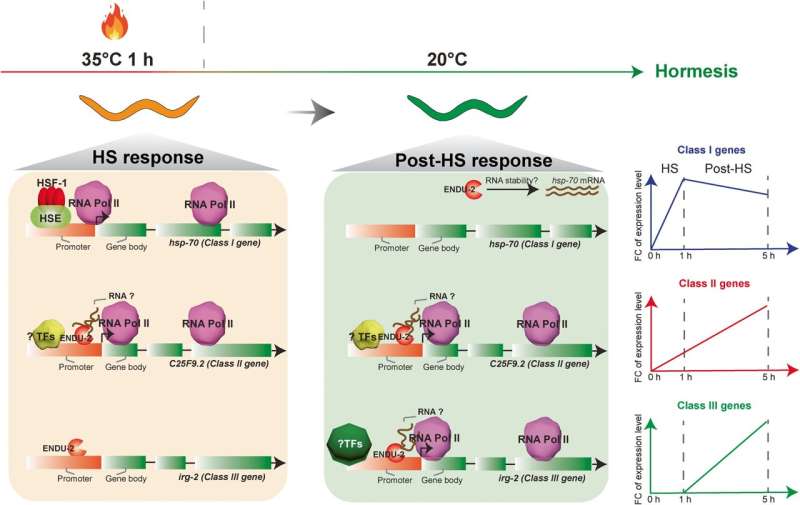This article has been reviewed according to Science X's editorial process and policies. Editors have highlighted the following attributes while ensuring the content's credibility:
fact-checked
peer-reviewed publication
trusted source
proofread
Brief heat stress may have health benefits

Biologist Dr. Wenjing Qi from the University of Freiburg has discovered a genetic long-term effect in nematodes that influences the body's stress response.
Heat stress is not always harmful. "It depends on the dose. Brief episodes of heat stress can even have positive aspects, such as a visit to the sauna," says Dr. Wenjing Qi, group leader at the Chair of Bioinformatics and Molecular Genetics at the University of Freiburg.
The fact that stresses that are actually harmful to the body can have health benefits in small doses is well known and is known as hormesis. Qi and her team have now discovered a genetic long-term effect in nematodes that could help answer how hormesis increases the body's stress tolerance over the long run. Nematodes are among the preferred laboratory animals for basic research on stress and aging. The findings recently appeared in the journal Nature Communications.
Organisms react to heat with a heat stress response that is controlled by the transcription factor HSF1. To save resources, HSF1, and thus the stress response, are only active when heat stress is present. Up until now, how long-term effects nevertheless occur after brief periods of stress has remained a mystery. Qi and her team have now exposed nematodes (Caenorhabditis elegans) to one or few recurrent heat stimuli and were able to show how an additional change in gene expression after the stress period is triggered by the enzyme ENDU-2.
Unlike HSF1, which as a gene switch docks directly onto the genetic material DNA, ENDU-2 controls its function through contact with messenger RNA, also known as mRNA. This copy of the gene information serves a crucial intermediate step in the production of proteins. Such mRNAs can be protected or degraded by ENDU-2 as needed.
What makes the newly discovered, heat-activated ENDU-2 special is that in addition to binding to messenger RNAs, it also associates with chromatin, the packaged DNA genetic material, and can thus indirectly influence gene activation. The researchers hypothesize that ENDU-2 helps loosen the packaging of those genes after heat stress that need to be expressed for long-term protection.
Exactly how this mechanism works in other organisms, as well as in humans, requires further research. And of course, severe or prolonged heat stress can still have a detrimental effect on the body. But the newly discovered hormesis mechanisms also show how an organism can respond and adapt, at least to some extent. "The short-term heat stimulus activates certain repair mechanisms, which then function better in the long term," says Qi. "The body learns to cope better with stress."
More information: Fan Xu et al, Reprogramming of the transcriptome after heat stress mediates heat hormesis in Caenorhabditis elegans, Nature Communications (2023). DOI: 10.1038/s41467-023-39882-8
Journal information: Nature Communications
Provided by University of Freiburg

















